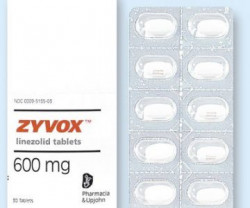Zyvox (linezolid) is an antimicrobial agent that kills certain types of pathogenic microorganisms. One way to save money on the Zyvox retail cost regardless of income and insurance status is to use Zyvox coupons or discount cards from RXCoupons. Use this Linezolid coupon at this online pharmacy and receive up to 75% off the sale price.
What is Zyvox
Zyvox (linezolid) is an antimicrobial agent that kills certain types of pathogenic microorganisms. Zyvox is used for the therapy of infectious and inflammatory diseases caused by aerobic and anaerobic gram-positive microorganisms sensitive to linezolid: community-acquired pneumonia, complicated skin and soft tissue infections, uncomplicated skin and soft tissue infections, infections resistant to vancomycin.
Possible contraindications of Zyvox
Zyvox is contraindicated in cases of hypersensitivity to the components of the drug.
Absolute contraindications for Zyvox tablets: combination therapy with isocarboxazid and phenelzine, patients with pheochromocytoma, uncontrolled arterial hypertension, thyrotoxicosis, patients using adrenomimetics and dopaminomimetics, carcinoid syndrome, children under 12 years of age (for tablets).
Relative contraindications (increased risk of side effects): severe renal failure, liver failure, pregnancy, lactation (breastfeeding should be discontinued).
How to use Zyvox
The duration of therapy and dosage are determined depending on the pathogen, localization and severity of the disease.
Zyvox injections for adults and children over 12 years of age: – Community-acquired pneumonia, nosocomial pneumonia, skin infections (including those accompanied by bacteremia) – 600 mg every 12 hours for 1-2 weeks. – Enterococcal infections (including those accompanied by bacteremia) – 600 mg every 12 hours for 2-4 weeks.
Dosing regimen for children under 12 years of age: – Community-acquired pneumonia, nosocomial pneumonia, skin infections (including those accompanied by bacteremia) – 10 mg/kg every 8 hours for 1-2 weeks. – Enterococcal infections (including those accompanied by bacteremia) – 10 mg/kg every 8 hours for 2-4 weeks.
Zyvox tablets are taken orally, regardless of food intake. Recommended dosage regimens: – Community-acquired pneumonia, nosocomial pneumonia – 600 mg every 12 hours for 1-2 weeks. – Infections of soft tissues and skin – from 400 to 600 mg (depending on the severity of the disease) every 12 hours for 1-2 weeks. – Enterococcal infections – 600 mg every 12 hours for 2-4 weeks.
Children from 5 years and older: 10 mg/kg of body weight per day, divided into 2 doses.
The maximum dose for children and adults should not exceed 600 mg 2 times a day.
Possible side effects
Undesirable effects associated with Zyvox in adults:
Digestive system: often – nausea, vomiting, diarrhea, abdominal pain, constipation, flatulence.
CNS: often – insomnia, cramps, dizziness, headache.
Genitourinary system: often – vaginal candidiasis.
Skin: often – rash.
Other: often – thrombocytopenia, fungal infections, fever, itching, dyspepsia.
Undesirable effects in adolescents aged 12 to 17 years:
Digestive system: often – nausea, vomiting, diarrhea, abdominal pain.
CNS: often – vertigo, headache.
Skin: rarely – itching; often – rash.
Respiratory system: often – infections of the upper respiratory tract, cough, pharyngitis.
Other: eosinophilia, fever, convulsions, peripheral neuropathy, lactic acidosis.
Zyvox cautions
Some patients taking linezolid may suffer from reversible myelosuppression (thrombocytopenia, leukopenia, anemia and pancytopenia). Therefore, it is necessary to monitor blood levels in patients with an increased risk of bleeding.
All patients using Zyvox should consult an ophthalmologist in case of symptoms of visual impairment.
Linezolid therapy can cause lactic acidosis. Therefore, careful monitoring is required for patients who have vomiting or nausea.
Patients should be monitored continuously to identify symptoms and signs of serotonin syndrome (hyperpyrexia, cognitive impairment, hyperreflexia).
Zyvox drug interactions
Zyvox can cause high blood pressure when combined with sympathomimetics, dopaminergic drugs and vasopressor agents.
Zyvox can lead to serotonin syndrome when combined with serotonergic drugs. These drugs are prescribed only for life indications.
Patients should not eat foods high in tyramine during Zyvox therapy (it is not advisable to use more than 100 mg of tyramine). High doses of tyramine can lead to high blood pressure. It is necessary to avoid yeast extracts, fermented soy products, aged cheese, etc.

